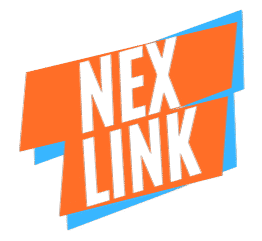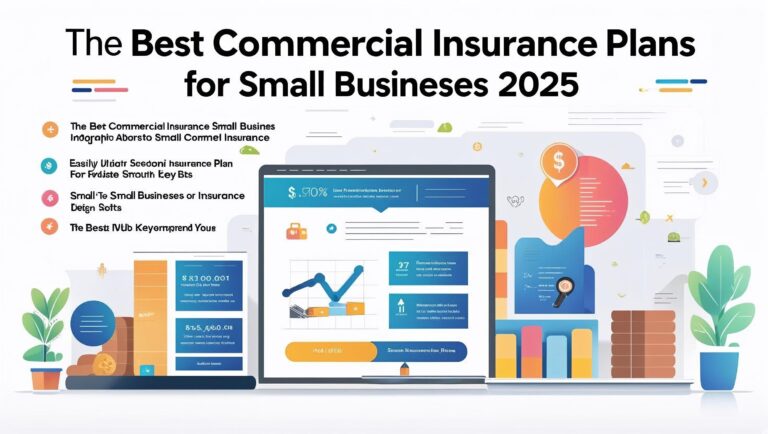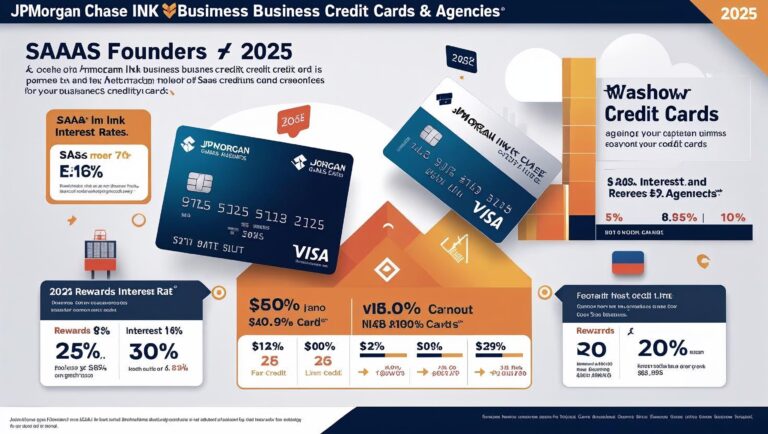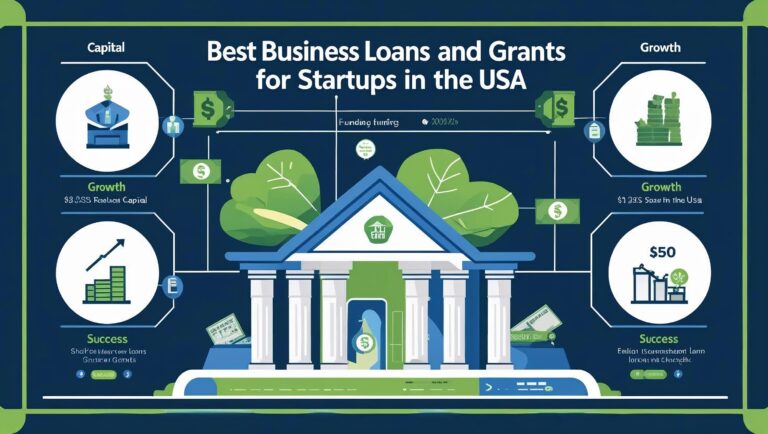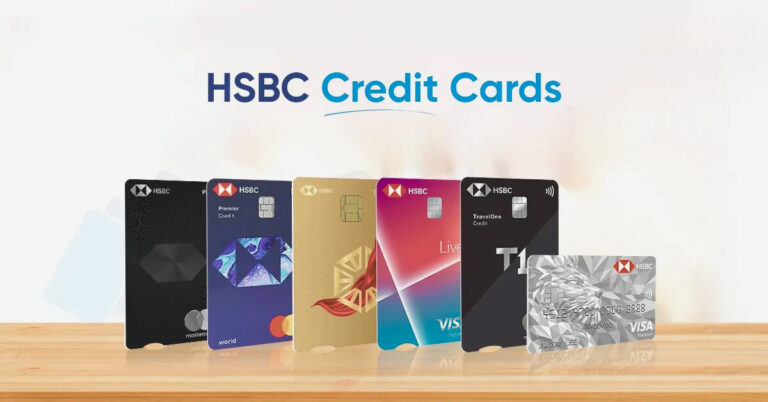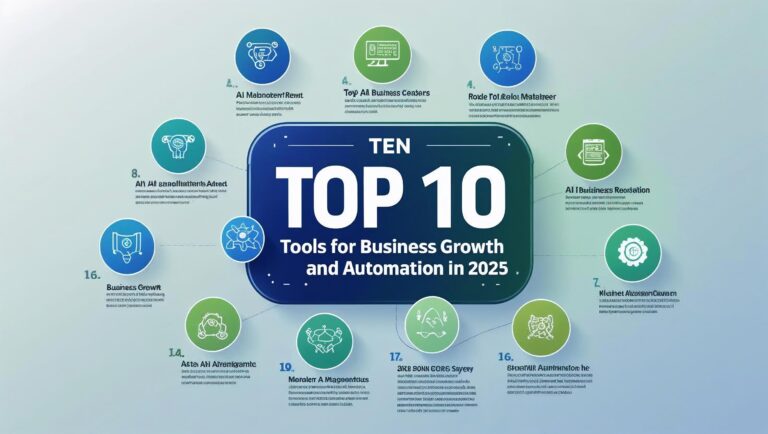Introduction
Customer relationship management (CRM) software has evolved into one of the most essential tools for modern businesses. In 2025, small businesses are prioritizing CRM solutions to improve customer retention, boost sales, automate marketing, and streamline operations. Whether you’re a solo entrepreneur or managing a growing team, choosing the right CRM software is a strategic decision that directly impacts your customer lifecycle and revenue growth.
Unlike the early 2000s when CRMs were built only for enterprise giants, today’s platforms are affordable, scalable, and loaded with features that cater to startups, freelancers, e-commerce sellers, service providers, and local businesses. This guide explores the best CRM software for small businesses in 2025—covering both free and premium options—along with real-world applications, trends, and tips to choose the right one.
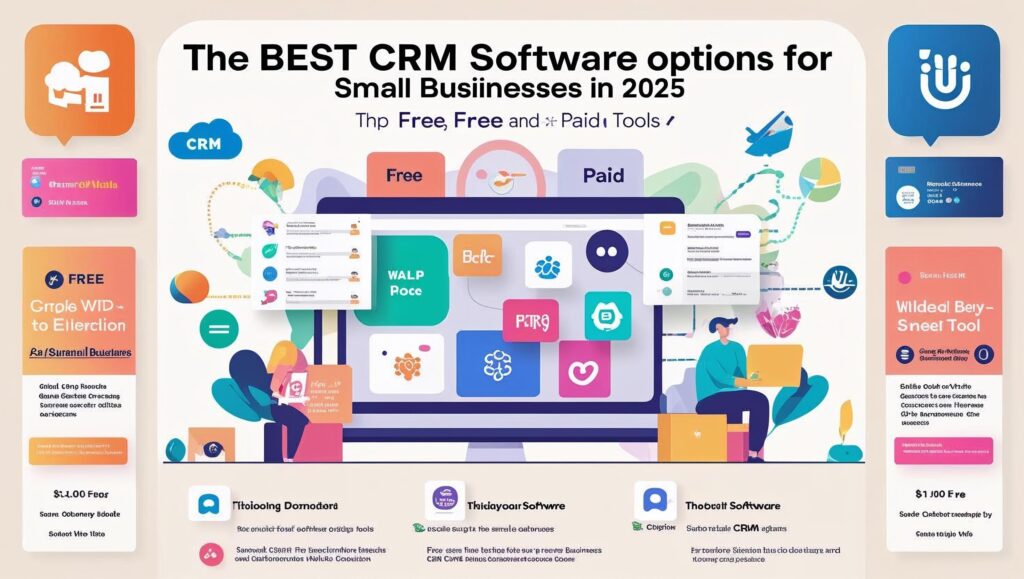
What is CRM Software and Why It Matters in 2025
CRM software is designed to help businesses manage interactions with current and prospective customers. It stores data, tracks communications, manages leads, and helps businesses personalize experiences across email, chat, calls, and campaigns. In 2025, CRM tools also integrate with AI, marketing automation, social media, e-commerce platforms, and payment gateways.
With customer expectations at an all-time high, small businesses need CRMs that offer proactive engagement, deep insights, and seamless communication across touchpoints. CRM isn’t just a database—it’s your entire customer strategy in one place.
Key Features of Modern CRM Solutions
In 2025, CRM platforms are built to be more intuitive and automated. Standard features that small businesses need include contact management, pipeline tracking, email marketing, task automation, reporting, and integrations with third-party tools like Slack, Zoom, and Stripe.
Many platforms now offer AI-driven recommendations, lead scoring, predictive analytics, and native mobile apps. Tools like real-time alerts, shared inboxes, customer sentiment analysis, and chatbots are now common even in free CRM solutions.
Benefits of CRM Tools for Small Businesses
CRM software helps businesses streamline operations, improve customer satisfaction, and scale without chaos. With one centralized platform, you reduce manual errors, improve follow-ups, and make data-driven decisions.
In 2025, the biggest benefits for small businesses include improved team collaboration, enhanced sales forecasting, targeted marketing automation, real-time customer support, and simplified customer onboarding. Businesses using CRMs report a 29% increase in sales productivity and 35% improvement in customer retention.
Best Free CRM Software for Small Businesses in 2025
HubSpot CRM
HubSpot remains a top choice for small businesses thanks to its forever-free CRM plan. It offers contact management, deal tracking, email integration, activity timeline, live chat, and form creation. In 2025, it introduces AI-powered email replies, pipeline automation, and integration with WhatsApp and TikTok Ads.
Zoho CRM Free Edition
Zoho CRM’s free plan supports up to 3 users and provides core CRM features like lead management, workflows, mobile access, and basic reporting. It’s ideal for freelancers or early-stage startups looking for an easy entry into CRM without cost.
Bitrix24
Bitrix24’s free plan includes CRM, project management, calendars, chat, invoicing, and document sharing—all from one dashboard. With unlimited contacts and AI task suggestions, Bitrix24 is excellent for service-based businesses.
Freshsales Free Tier
Freshsales offers a clean, easy-to-use free tier that includes lead capture, contact scoring, basic email templates, and mobile CRM. In 2025, it adds AI-enhanced deal recommendations and smart call transcription to the free plan.
Best Paid CRM Software for Small Businesses in 2025
Salesforce Essentials
Salesforce remains the industry leader with its small business product, Salesforce Essentials. Priced at $25/user/month, it includes full pipeline management, customizable dashboards, Einstein AI insights, and native mobile CRM. Salesforce continues to lead with best-in-class integrations and reliability.
Monday Sales CRM
Monday.com’s CRM platform offers drag-and-drop workflows, advanced sales automation, and marketing integrations. It’s built for visual thinkers who want to track leads, manage tasks, and automate reminders in a kanban-style board. Its 2025 version includes AI suggestions for next actions.
Pipedrive
Pipedrive is a user-friendly CRM designed to help sales teams stay focused. It provides pipeline management, automation, call logging, and email tracking. In 2025, Pipedrive offers AI-powered sales predictions and revenue heatmaps for faster decision-making.
Zoho CRM Plus
Zoho’s full-stack solution includes CRM, campaigns, social media tools, and analytics. It’s a solid choice for businesses looking for an all-in-one suite. In 2025, it adds biometric login, deeper analytics, and sentiment tracking powered by machine learning.
Keap (formerly Infusionsoft)
Keap is perfect for small service providers who need a CRM with robust email marketing and invoicing tools. It supports appointment booking, lead capture forms, and automations tailored to service-based workflows.
Comparison Table: Free vs Paid CRM Tools in 2025
| Feature | Free CRM Tools | Paid CRM Tools |
|---|---|---|
| Contact Management | Yes | Yes |
| Sales Pipeline | Basic | Advanced with automation |
| AI Features | Limited | Extensive (lead scoring, insights) |
| Integrations | Standard | Deep and customizable |
| Email Marketing | Basic | Advanced with analytics |
| Reporting & Analytics | Limited | In-depth with forecasting |
| Mobile Access | Yes | Yes |
| Support | Community forums | Priority + live chat/email |
Underrated CRM Tools You’ve Probably Never Heard Of
In 2025, there are hidden gems in the CRM space that haven’t yet gained mainstream attention but offer powerful features and pricing advantages for small businesses.
OnePageCRM
Built for action-focused sales teams, OnePageCRM eliminates traditional CRM clutter. It uses a next-action sales method to keep pipelines organized. Unlike bloated tools, its simplicity boosts productivity while retaining powerful integrations with Mailchimp, Zapier, and QuickBooks.
Bigin by Zoho
Bigin is Zoho’s lightweight CRM for microbusinesses and solopreneurs. It offers automation workflows, telephony integrations, and mobile access with a Kanban board interface. Ideal for service-based freelancers looking for a CRM with minimal learning curve.
EngageBay
A growing alternative to HubSpot, EngageBay combines CRM, marketing automation, live chat, and helpdesk functions. It provides advanced features like web popups, landing pages, A/B testing, and behavioral triggers—all in one low-cost tool.
Flowlu
Flowlu offers CRM, project management, mind mapping, invoicing, and a client portal. Perfect for agencies and consultants who want more than just a CRM. With built-in knowledge base management and time tracking, it’s an all-in-one suite many don’t know exists.
Experimental CRMs for Niche Markets in 2025
Some CRM systems are now evolving to serve ultra-specific needs and industries. These experimental CRMs target sectors where standard CRM platforms fall short.
TutorBird CRM
Specifically designed for private tutors, TutorBird manages lesson schedules, payments, progress tracking, and parent communication. It’s built with education in mind—something most CRMs ignore.
HoneyBook
Popular among event planners, photographers, and creatives, HoneyBook blends CRM features with contract management, online payments, and branded client portals. It excels in user experience and client onboarding automation.
Practice Ignition (now Ignition)
Built for accountants and bookkeepers, Ignition automates proposal creation, engagement letters, billing, and CRM management. It integrates with Xero and QuickBooks Online, offering niche capabilities that general-purpose CRMs lack.
Claritysoft CRM
Claritysoft targets field service businesses, manufacturers, and logistics companies. With strong offline capabilities, inventory modules, and quote tools, it’s quietly becoming a go-to CRM for complex operational models.
Factors to Consider When Choosing a CRM
When selecting a CRM for your small business, it’s essential to consider your business model, number of team members, integration needs, and growth expectations. A freelance consultant may thrive on a free, lightweight solution like HubSpot or Zoho, while an e-commerce team might benefit from the deeper automation and analytics of Salesforce or Monday CRM.
Evaluate the ease of use, onboarding process, customization ability, mobile support, and pricing model. Also consider data portability and whether the platform supports GDPR, HIPAA, or regional compliance if needed.
Real-World Use Cases in 2025
A digital marketing agency uses Pipedrive to manage 400+ client pipelines, track proposal statuses, and automate follow-up reminders, resulting in a 40% increase in deal closures.
An online fitness coach uses Keap to send onboarding sequences, track progress check-ins, and automate client retention campaigns—saving 15 hours of manual admin per week.
A SaaS startup integrates Salesforce Essentials with Stripe and Intercom to unify billing, customer support, and upsell opportunities in one CRM view, boosting cross-sell revenue by 22%.
CRM Trends to Watch in 2025
The CRM landscape in 2025 is defined by AI, automation, and hyper-personalization. Expect to see more voice-activated CRMs, emotion-sensing support agents, and deeper integration with social commerce platforms.
Augmented Reality (AR) is making its way into customer demos and virtual onboarding inside CRMs. Data privacy features, blockchain authentication, and unified CX platforms are rising fast.
The future of CRM is real-time, intuitive, and embedded into the daily workflow of small businesses.
FAQs
Q1: What is the best free CRM for a small business in 2025? HubSpot remains the top free CRM for 2025 due to its ease of use, integrations, and AI-powered features.
Q2: Are paid CRMs worth the investment? Yes, especially if your business is growing and you need automation, analytics, or team collaboration features that go beyond what free tools offer.
Q3: Can CRMs help with customer retention? Absolutely. By automating follow-ups, capturing customer behavior, and providing timely support, CRMs significantly boost customer loyalty.
Q4: Is CRM useful for freelancers? Yes. Freelancers can use CRMs to manage clients, follow-ups, contracts, and invoicing in one platform.
Q5: How do CRMs integrate with marketing tools? Modern CRMs connect with email marketing tools, ad platforms, and social media dashboards, allowing for unified customer experiences and targeted campaigns.
Conclusion
CRM software has become the digital nerve center for small businesses in 2025. Whether you’re running a solo venture or a growing team, adopting the right CRM tool helps you streamline operations, increase revenue, and build lasting customer relationships.
With a wide range of free and paid tools available, there’s a CRM out there for every business type and budget. Prioritize scalability, ease of use, and integrations as you make your decision. CRM is no longer optional—it’s foundational to business success in a digital-first world.
Choose wisely, implement consistently, and watch your customer relationships transform into your biggest growth engine.
